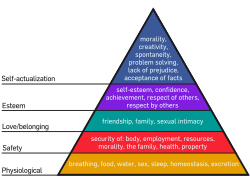Self-esteem
Self-esteem is the way people think about themselves and how worthwhile they feel. Psychologists use the word self-esteem to describe whether someone likes themselves or not. Someone with high self-esteem might think that they are good at things, worthwhile, and may be confident in the things that they do. Someone with low self-esteem might think that they are bad at things and/or worthless. Different psychologists have different ways of measuring self-esteem, and many people do not agree on what it means. Some people may think that self-esteem is linked to anxiety, depression, eating disorders and bullying. Some people may also injure themselves if they suffer from a low self-esteem.
Self-esteem also considered by the international law on human rights, such as Convention on the Rights of Persons with Disabilities and Yogyakarta Principles, affirm that each person's self-esteem must be protected against any kind of abuse or violence out of social prejudices and discriminations.
The World Health Organization also thinks building strong self-esteem is important to prevent the suicide of students as well as prevent bullying by tolerance.[1]
